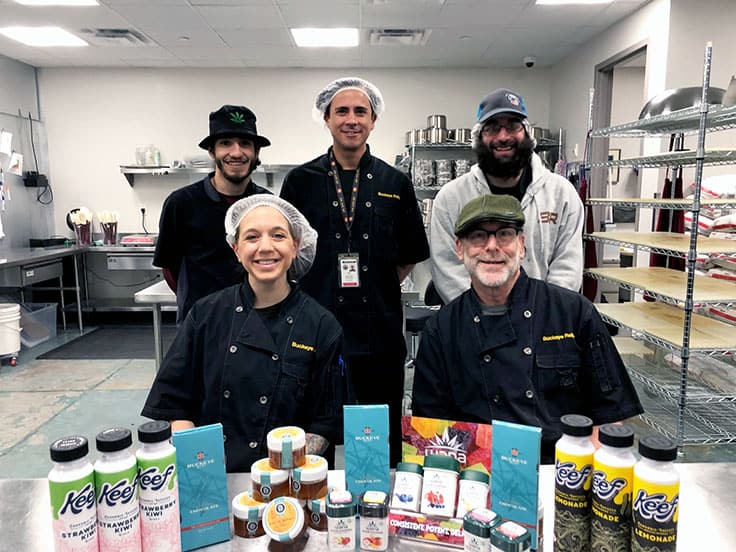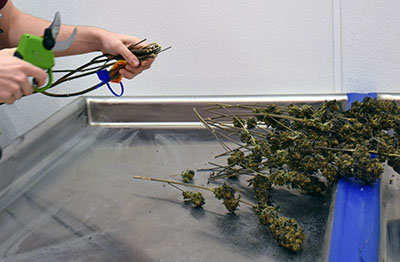Connecticut Gov. Ned Lamont’s adult-use cannabis bill is far from the finish line, but the criminal justice aspect of the legislation was vetted and approved by the Joint Judiciary Committee in a 22-16 vote April 6.
The proposed legislation, An Act Responsibly and Equitably Regulating Adult-Use Cannabis, which Lamont unveiled during his budget address Feb. 10, would authorize the automated erasure of criminal records for those with cannabis-related drug possession convictions and charges.
The overall bill remains a work in progress—with language involving financial issues, regulatory issues, licensing issues and more— but the Judiciary Committee’s due diligence was to get the criminal justice components of the bill right, said Rep. Steven Stafstrom (D), who co-chairs the committee and also co-sponsors the legislation, Senate Bill 888.
“Our cognizance really is on the criminal justice, erasure piece, and I certainly have not heard much opposition to that because I think the language we have in here is language we’ve vetted through fairly well on the criminal justice aspects,” he said during the committee’s meeting on Tuesday.
“On the criminal justice components of this bill, this bill retains and improves upon the language we’ve seen for the last couple years on erasure of prior cannabis convictions,” Stafstrom said. “It puts in place what I believe to be an appropriate mechanism to deal with the issue of driving under the influence, something that is I know of particular interest to this committee, particularly given the fact that neighboring states are undertaking legalization.”
Included in S.B. 888, law enforcement units would be required to have a minimum number of officers report to the Police Officer Standards and Training Council no later than Jan. 1, 2022, so that each unit has state-accredited drug recognition experts to ensure adequate availability of drug recognition experts can respond to instances of impaired driving. Law enforcement units would be able to call upon drug recognition experts from other law enforcement units as necessary and available.
To execute on that front, the Police Officer Standards and Training Council would work with the Highway Safety Office within the Department of Transportation to issue a joint plan to increase access to advanced roadside impaired driving enforcement training and drug recognition expert training for police officers and law enforcement units throughout the state, according to the bill.
Roadside safety and what constitutes probable cause during traffic stops without roadside tests available for cannabis, such as a breathalyzer test for alcohol, has been a reservation of legalizing adult-use cannabis among lawmakers in other states. Last week, roadside safety was part of the debate on the House floor of the New York Legislature.
“As we move through our legislative process, we are not oblivious to what is happening around us, and certainly just last week, New York put in a legalization and regulatory framework,” Stafstrom said. “Massachusetts, to our north, certainly has had legalized cannabis for several years. I think what we are trying to do as we maneuver through this process is to align our legalization effort in as many respects as we can with our neighboring states. And, so, we continue to study what has worked and what has not worked in other locations.”
During the Judiciary Committee meeting, Stafstrom highlighted several amendment’s to S.B. 888 that he said were made to address concerns the committee members heard during a public hearing on the bill.
According to Stafstrom, the Judiciary Committee’s revised bill:
- Adds legislative appointments to the Social Equity Council and gives it additional authority as a permanent body to develop the means to ensure potential societal, equitable applicants have access to licenses, and that individuals from disproportionately impacted communities can get jobs in the industry.
- Includes definitive language to clarify that from July 1, 2021 through Jan. 1, 2024, only the existing medical establishments and social equity applicants can open cannabis establishments; and that cannabis establishments have a social equity plan and agree to labor peace and prevailing wage provisions.
- Creates an accelerator program to provide technical support, mentoring, networking and apprenticeship opportunities for social equity applicants; and creates a workforce pipeline program to help individuals from impacted communities get jobs in the industry.
- Allows patients in the medical program to home grow up to six plants starting May 1, 2022.
- Provides the framework for issues involving local zoning and local control of allowing cannabis establishments in individual municipalities.
- Provides additional employer protections, particularly for federal defense contractors.
- Proposes that the revenue generated from the sale of cannabis be spent 55% on social equity efforts, 15% to grants for prevention and recovery services and 30% to the general fund to cover administrative costs.
“Those are proposals coming out of this committee based on the concerns and the testimony we heard at the public hearing, but certainly this is not the end of the conversation of the bill before us,” Stafstrom said. “I’m sure we’ll see additional revision as it moves through the legislative process and its next committee of assignment.”
Sen. Gary Winfield (D), who co-chairs the Joint Judiciary Committee, said S.B. 888 is a piece of legislation that he knew from the beginning was going to have a lot of effort put into it, and that he hopes the adult-use conversation continues so that the interests of all involved are represented.
“We also kind of knew that when we got to this point [the bill] wouldn’t be completely baked but that the conversation will continue after this point,” Winfield said. “There are people, both in the legislature and outside the legislature, who paid a lot of attention to this and have a lot of interest in the subject and have things that they want to see in this bill.”
All 22 yay votes out of the committee were from Democrats, while the 16 nays included 13 Republicans and three Democrats.
Rep. Craig Fishbein (R), a ranking member of the committee, said he could not support S.B. 888, or any cannabis legalization bill for that matter, until cannabis is federally legalized.
“Unfortunately, at the very outset, I, in respect for the oath that I took as a state representative to uphold the federal and state constitution, cannot find myself to be in support of this,” he said. “The fact of the matter is, we come together as the United States. And the federal constitution says that under the Supremacy Clause, if the federal government passes a law that state can’t invalidate it.”
Article VI, paragraph two of the U.S. Constitution is commonly referred to as the Supremacy Clause. It establishes that the federal constitution, and federal law, generally take precedence over state laws, and even state constitutions, according to Cornell Law School.
“State can’t say, ‘We don’t like that particular federal law,’ and do their own thing,” Fishbein said. “Through our representative government, we send representatives to Washington to represent our interests, and if residents of our state feel that this is a proper overture, then our representatives, our senators, our congresspeople advocate for a change in the federal law.”
While cannabis is not federally legal, the U.S. Department of Justice has not extended its reach to prosecute state-legal cannabis businesses in a fashion that has deterred lawmakers in 18 states and the District of Columbia from passing adult-use legalization measures. And before the U.S. Senate confirmed Merrick Garland as the 86th U.S. attorney general last month, Garland testified that he did not think it was a “useful use” of limited federal resources to prosecute most cannabis-related conduct.
S.B. 888 is not the only cannabis legalization bill being considered in the Connecticut Legislature. House Bill 6377, which emphasizes social equity and includes licensing for social consumption sites and provisions for roadside testing, cleared Connecticut’s Labor and Public Employees Committee, 9-4, on March 25.
But with the Judiciary Committee passing its amended version of Gov. Lamont’s S.B. 888 Tuesday, the two pieces of legislation are now more closely aligned—both measures have been filed with the Legislative Commissioners’ Office.
Stafstrom said, “I would submit that [adult-use cannabis] is long overdue here in the state of Connecticut for a whole host of reasons, not the least of which is that this is a drug that is widely believed to be less addictive and less harmful to the body than many other drugs that we already legalize and regulate here in the state of Connecticut, including tobacco and alcohol.”









